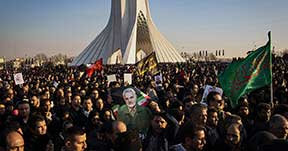Nathan Gardels is the editor-in-chief of Noema Magazine. He is also the co-founder of and a senior adviser to the Berggruen Institute.
The deepest wound, in persons or nations, is always the wound of humiliation. Lodged so deeply in the psyche where nothing is ever lost, it is the hardest to erase. As if locked in a negative cycle of karmic retribution, or Nietzsche’s “eternal recurrence,” wounded pride keeps bleeding. As Isaiah Berlin understood, a bent twig always snaps back with fury no matter how much time passes.
Just as nationalists in Iran will never forget the overthrow of Mohammed Mossadegh and the restoration of the shah in 1953 by the CIA and British intelligence, neither can Americans forget the taking of hostages at the U.S. embassy in the wake of Islamic Revolution in 1979.
This dynamic is playing out once again after the drone assassination by the U.S. of Iranian Revolutionary Guard Corps leader Qasem Soleimani, the most senior official of any internationally recognized sovereign state taken out by extrajudicial killing in recent history. Following his deeply flawed instincts that push all the wrong buttons, U.S. President Donald Trump linked his threat against any Iranian retaliation to the 52 American hostages, declaring he would strike the same number of targets in Iran. Though his defense secretary has publicly disagreed, the president even threatened to strike Iranian cultural sites, the very beating heart of national memory and identity.
In the name of punishing Iran and weakening it in the hope of fomenting regime change, Trump has done the opposite. Revolutions only succeed with the support of the people. But they can only be sustained decades later into a moribund state, when all ideals have long faded, by an implacable external foe that justifies the continuing grip on power by the now-elderly revolutionaries.
This is the consistent message that Abolhassan Bani-Sadr, the first president of the Islamic Republic after the revolution, has imparted to me since I first met him in the early 1980s in a shuttered mansion outside Paris, where he fled into exile after losing out in the struggle for democracy to the ayatollahs.
“The Iranian regime is deeply broken from within,” he told me this week. “Only its external relations, primarily with the U.S., have sustained it so far. Trump and his policies, in fact, support the regime. The bloodbath the regime waged against widespread protests in November barely enabled the regime to save itself. Even the ‘principalists,’ [Supreme Leader Ayatollah Ali] Khamenei’s core supporters, have been moving against him. However, this assassination forces all factions within the regime to rally around him. The November bloodbath will be forgotten and disaffected Iranians will be silent for a while. Khamenei is hoping that Trump continues to support him in such a way.”
In history there is no innocent causation. As everyone was well aware, Soleimani’s whole gambit was to destabilize the Middle East, including through acts of terrorism, with the aim of expelling American forces from the region in order to extend Iran’s dominion against Saudi Arabia and its allies in the centuries-long struggle between Shiite and Sunni Muslims. In that context, Trump’s macho posturing of “standing up to the enemy,” compounded by astonishing ineptness and ignorance, only reveals, once again, the weakness of the waning American superpower that ends up only playing into the hands of its enemies.
When then-Vice President Dick Cheney attended the World Economic Forum in Davos in 2004, a handful of us journalists were invited to lunch with him. Already then, Jordan’s King Abdullah was sounding the alarm that toppling Saddam Hussein in a majority Shiite Iraq had paved the way for the emergence of a “Shiite crescent” that would dominate the region. When asked about this, Cheney offered only a puzzled grimace at such a preposterous notion.
Fifteen years later, in its first full-scale assessment of the war, the U.S. Army War College concluded that “an emboldened and expansionist Iran appears to be the only victor” of the Iraq War. The report’s authors continue: “Iraq, the traditional regional counterbalance for Iran is at best emasculated, and at worst has key elements of its government acting as proxies for Iranian interests. With Iraq no longer a threat, Iran’s destabilizing influence has quickly spread to Yemen, Bahrain and Syria, as well as other locations.”
Now, Trump has posthumously handed Soleimani and the hardliners in Iran everything they ever wanted: The Iraqi parliament voted on Sunday to expel American forces and the Iranian regime has announced its program to develop nuclear weapons will be resumed and accelerated.
The best course ahead is the opposite of the one we are presently on. Bani-Sadr’s analysis is as acute as his weary hope is improbable in the present circumstances: “Both sanctions and terror [by Iran] create a closed circuit between the U.S. and Iran,” he says. “In this circuit, it is hard to sustain protests for democracy.”
“This crisis,” he continues, “therefore undermines the democratic movement. It is thus vital to bring the country out of this closed circuit. We see such movements in Algeria, Lebanon and Iraq, which aim both to become independent of foreign powers and abolish despotism at home.”
While the American architects of the ill-fated Iraq War chastised President Barack Obama for “leading from behind” by consorting too closely with allies in his judicious use of American power, Trump trashed what his populist temper regarded as wimpy engagement with America’s enemies. Perhaps the yet-to-fully unfold consequences of Trump’s strategy-less impulses will finally confirm the wisdom of Obama’s approach.
As Obama understood, opening the breathing space through the nuclear accord Trump abandoned, not tightening the noose, remains the most likely way both to keep Iran’s nuclear threat at bay and to invigorate the democratic movement within Iran.





